The New Bazaar
All Episodes
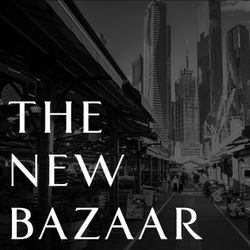
AI and the Human Touch
44:13|EIG chief economist Adam Ozimek chats with Cardiff Garcia about Adam’s new post, AI and the Economics of the Human Touch. An excerpt: Either AI is so useless that we are in the middle of a bubble that’s about to burst and take the economy down with it, or AI is so powerful it’s going to replace us all and devastate the labor market.The pessimism in speculation about the economic effects of artificial intelligence is often so overwhelming that these opposing concerns can even come from the same person. AI is evolving fast enough that we should not entirely ignore the economic doomers, though it would be nice if they could at least be consistent.But it is essential to balance the discussion with some optimism. I can see glimmers of hope in a simple fact: There are many jobs and tasks that easily could have been automated by now — the technology to automate them has long existed — and yet we humans continue to do them. The reason is that demand will always exist for certain jobs that offer what I call “the human touch.”The specific jobs that require the human touch may themselves change or evolve, but I suspect that such jobs will continue to exist long into the future.Adam and Cardiff discuss the job that inspired Adam’s post, why the Olive Garden represents a hopeful future for work in an age of AI, the perils and promise of AI for caregiving jobs, and how Adam himself plans to prepare for the eventual automation of his daily tasks.Related links: Adam’s postAgglomerations homepage (subscribe!)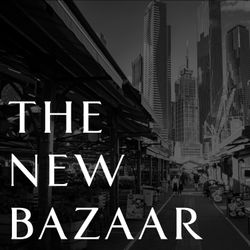
Crime, Leniency, and the Science of Second Chances
01:07:13|Jen Doleac is an economist and the director of the Criminal Justice program at Arnold Ventures. She joins Cardiff on the show to chat about her upcoming new book, “The Science of Second Chances: A Revolution in Criminal Justice”. From the book jacket: Freakonomics for criminal justice, The Science of Second Chances presents a groundbreaking approach to criminal justice reform, revealing how small-scale interventions can reduce people’s chances of reoffending and break the incarceration cycle… Drawing on cutting-edge economic research and real-world experiments, the book presents a blueprint for reform that runs all the way through the system. Doleac shows how economists like herself approach big, complicated problems as if they were scientists in a lab, carefully testing different approaches and following the data to maximize impact. She explains how shifting the incentives people face can produce dramatic changes in the decisions they make, significantly reducing the number of people cycling through the prison system. Jen and Cardiff discuss the unique approach and contributions of economists to understanding the criminal justice system, why erring towards leniency so often leads to less reoffending, and the surprising failures of ideas that seem sensible. Along the way they examine the evidence needed to answer questions like: How long should prison sentences be? How should probation be structured? For people who do go to prison, what kinds of incentives should we give them for how they spend their time there, how they rehabilitate themselves? How should we take into account variables like age or mental health? And what happens when someone gets out of prison? What are the best policies to put them on the path to success?Jen herself has spearheaded a lot of the research behind this evidence, and she also has detailed knowledge of the work done by other economists in the field. So she’s about as well positioned to evaluate it as anyone Cardiff knows.And her work is about more than just using limited resources in the best possible way (although that’s great) and more than just making society better and safer (also great). It’s about finding ways to help individuals get their lives back on track, so that a mistake made early in life doesn’t end up defining everything that comes after. Related links: Science of Second Chances pre-order linksJennifer Doleac’s page at Arnold Ventures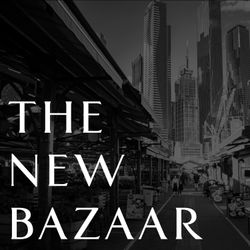
The Licensing Racket
01:01:01|Nearly 30 million workers, or roughly one in five workers throughout the country, are required to have a professional license before they can do their jobs.That’s more than twice the number of workers who belong to unions. And it’s almost ten times the number who earn the minimum wage. But in comparison to those other economic arrangements, curiously little attention is given to the process that governs licensing, the perverse outcomes it so often leads to, and the vulnerable workers who are affected by it. Cardiff’s guest on this episode is Vanderbilt law professor Rebecca Haw Allensworth, author of “The Licensing Racket: How we decide who is allowed to work, and Why it goes wrong.” Among Cardiff’s picks for the economics book of the year, it is the product of not just a scholarly understanding of the topic, but of years and years of painstaking reporting, interviewing hundreds of people, and unearthing a variety of frankly shocking anecdotes. She and Cardiff discuss: The legal and institutional design behind the boards that oversee licensing in each stateHow the desire to protect the already licensed leads board to impose outrageous requirements for new licensesThe ludicrous rationalizations of so many licensing boards for erecting obstacles to new workers entering their professions The shocking failure of licensing boards, especially within medicine, to actually fulfill the mission they are set up to pursue: protect public safetyHow the ratcheting up of licensing requirements led to a standoff between nurses and doctorsHow licensing hurts dynamism and entrepreneurshipThe more substantive tradeoffs involved in licensing, including the pride and validation that existing practitioners feel in having a licenseWhich jobs shouldn’t require a license, and for those that do, a better way forward All throughout, Rebecca shares with Cardiff the tales of the workers, board members, and the others she interviewed.Related links: The Licensing Racket, by Rebecca Haw AllensworthRebecca Haw Allensworth page at Vanderbilt Law School
The surprising economics of the world’s most valuable asset
01:00:00|Mike Bird, the Wall Street editor of The Economist, joins Cardiff to discuss his new book, The Land Trap: A New History of the World’s Oldest Asset.By one estimate, the value of land makes up roughly a third of all the wealth in the entire world. Add the houses and commercial buildings on top of the land and the total value is almost two-thirds. And according to Mike, land “defies some of the usual laws of capitalism that apply to other goods and assets.” Its supply is fixed, it is immobile, and it neither decays nor depreciates. These special qualities have given land its fascinating history. They’re also the reason that so many economies end up in what Mike refers to as the land trap.Mike and Cardiff discuss: The definition of a land trapWhy booming land values are a problem while they’re rising and not just because they often set the stage for a bustHow land affects older, established companies differently than newer, innovative businesses — and why that matters for the economy The perverse incentives that rising land values can have on a nation’s economyThe land histories of America, China, Hong Kong, Japan, and Singapore Land reform and the development of low-income countries The lessons of Singapore And more! Related links: The Land Trap, A New History of the World's Oldest AssetHousing booms, reallocation and productivity, by Sebastian Doerr, BIS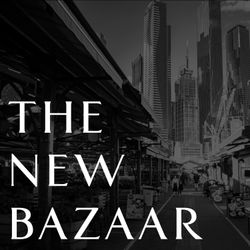
Lessons of the Rare Earths Showdown
58:51|How can the United States make its economy more resilient not just to future economic shocks but the threat of such shocks from its geopolitical rivals? Arnab Datta has spent years working on this very question. In the immediate aftermath of the recent rare earths showdown between America and China, Datta and his colleagues at the Institute for Progress and Employ America published a new analysis titled How to Implement an Operation Warp Speed for Rare Earths.China’s global dominance in rare earths, acquired over decades, allows it to “gain leverage in trade negotiations, retaliate against American restrictions, degrade American and allied technological capabilities, and potentially even to entrench its dominance in downstream rare earth-dependent manufacturing supply chains,” write Datta, Saif Khan, Tim Hwang, and Tim Fist. The scope of the report extends well beyond the specific threat of a shock to America’s supply of rare earths. It speaks to the very nature of the ongoing geopolitical dispute with China itself — and more broadly, to the question of how best to respond when a single country has taken steps for decades to distort the global market of a product that the entire world depends on.Why did the United States fail to spot the emerging threat? How should it respond now — and in such a way that embraces core American economic values like competition and innovation? Related links: How to Implement an Operation Warp Speed for Rare EarthsArnab’s work at Employ AmericaArnab’s work at the Institute for Progress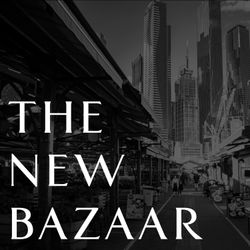
Housing and the Politics of Place
48:54|What accounts for the astonishing streak of YIMBY wins this year — and which concessions, if any, should they consider offering to the NIMBYs? Should the center-left Abundance faction be trying to persuade conservatives and not just progressives? Do struggling places need more market-based solutions (high-skilled immigration, tax incentives for investing in low-income communities) or more straightforward redistribution and pubic investment (in infrastructure, job training, internet access)? Are liberals ceding too much ground to anti-immigrant sentiment? And should the most famous museums in the world stop hoarding their artwork? Live on stage at the Economic Innovation Group’s annual Power of Place Conference in Washington, DC, Cardiff spoke with Slow Boring author Matt Yglesias about these topics and more. Matt also reflects on how things have changed since his two books, The Rent is Too Damn High and One Billion Americans, were released. They close with their respective picks for best movie of 2025 and the likely winner of the NBA Finals. Related links: Slow Boring The Rent is Too Damn HighOne Billion Americans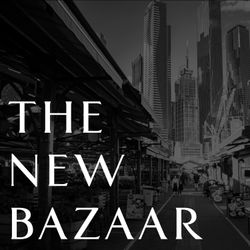
Attention and the Possibility of Persuasion
01:11:06|Jerusalem Demsas is one of Cardiff’s favorite econ and housing journalists, a previous New Bazaar guest, and now the founder and editor of The Argument, a new magazine dedicated to making “a positive, combative case for liberalism through sharp, well-argued opinion pieces, original reporting, and multimedia content that confronts the illiberal drift in our politics.” Jerusalem and Cardiff discuss: Her meaning of liberalismHow (if?) persuasion works The politics of immigration and why it matters for the economy Drawing lines vs reaching across themIf Twitter really is “acid on community” How to societally deal with short-form video addiction…… and how Jerusalem broke her own TikTok problemWhy asking if something is cringe is itself the most cringe Finally, Jerusalem makes Cardiff look and feel super old when his reference to Reality Bites flies right by her. They close by reflecting on a hopeful trend. Related links: The ArgumentOn the Housing Crisis (Jerusalem’s book of essays)Ezra Klein’s podcast interview with Ta-Nehisi Coates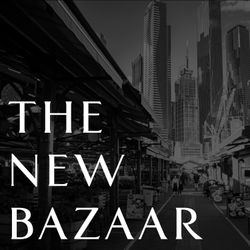
Is the US about to fix its housing problem?
01:14:59|The ROAD (Renewing Opportunity in the American Dream) to Housing Act is a bipartisan bill now making its way through Congress. And as today’s guest, Alex Armlovich, and his colleagues at the Niskanen Center argue, it is “the first comprehensive bid to tackle the roots of America’s affordability crisis in a generation—it correctly identifies, and takes initial steps to attack, the interlocking barriers to housing abundance at every level.” Not only that, but the bill is “miraculously bipartisan, and its negotiation and development exhibited a stunning, almost anachronistic return to the old Senate tradition of depolarized collegiality and bipartisan problem-solving.”But before discussing the contents of the bill, Alex and Cardiff first talk about recent shifts in housing-policy alliances, the roots of the housing affordability and availability problem, housing experiments that have worked (and haven’t), the roll of the “Abundance” movement, and the genuine collective-action problems that housing advocates too often ignore. Then they break down the ROAD to Housing Act into three main buckets, going into detail on each: 1) Regulatory reform, 2) carrots and sticks, and 3) financing and funding. They also comment on what the bill would fix and what it wouldn’t, and its chances of becoming law. Finally, Alex and Cardiff reflect on housing, construction, and the nature of physical change in New York City, where both have spent the bulk of their adult lives. Related links: Alex Armlovich about page (at Niskanen Center)Niskanen Center home page (where the upcoming ROAD to Housing Act analysis from Alex and his colleagues will appear)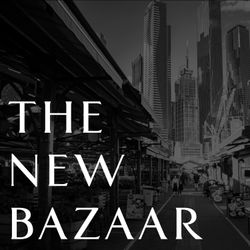
Bubbly markets and the TACO trade
01:08:11|Rob Armstrong is the writer who first coined the acronym in The TACO Trade, which stands for Trump Always Chickens Out, in a column back in April. He wasn’t trying to go viral, much less have the acronym circulate throughout Wall Street and the media, much less have President Trump be asked about it. But that’s what happened. Armstrong is the Unhedged columnist and podcaster at the Financial Times. He also had a prior career at a hedge fund, which abruptly ended in the Great Financial Crisis of 2008. He also has a PhD in philosophy, making him an unusual figure in the world of finance and economics journalism. The topics he writes about reflect this varied background. He and Cardiff reflect on the strangeness of coining a term that has such reverberations in a prominent national conversation, in this case the one surrounding President Trump’s tariff strategy, and whether the trade itself still applies. They also discuss how the feedback loops created by the acronym represent the fundamental nature of markets and the ways that societal narratives get around these days. But the main part of their chat is about US markets at the moment. Are they in a bubble? Why has there not been more of a negative effect from tariffs? And why has the US dollar fallen — and stayed fallen — while US stocks have returned to all-time highs just this week? What should we make of the horrific returns on long-term Treasuries this decade? And are higher interest rates truly here to stay? They also discuss Rob’s switch from working in finance to writing about it, and his recent column on Rene Girard and the mimetic rivalries that seem to define this political moment. Finally, they close with a surprising topic that Rob frequently also writes and speaks about: men’s fashion. Related links: The Unhedged Newsletter (Rob Armstrong)Unhedged Podcast (Katie Martin with Rob)A Wealth of Common Sense (Ben Carlson)The Overshoot (Matt Klein)Feed Me (Emily Sundberg)Rob’s Life & Arts columnRob’s FT style column
loading...